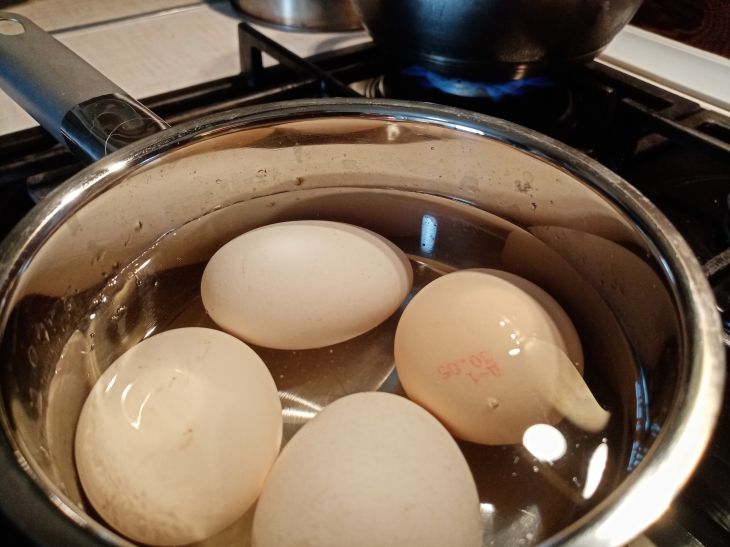How the Pros Boil Eggs: Master the Art of Boiling Eggs
Boiling eggs seems like a simple task, but getting them right can be tricky.
Whether you prefer soft-boiled, medium-boiled, or hard-boiled eggs, it's important to follow the step-by-step instructions to get the perfect result.
Eggs are a versatile and nutritious food that can be used in a wide variety of recipes.
From breakfast to salads, sandwiches and snacks, eggs are a staple in many dishes.
Cooking eggs properly is critical to achieving the desired consistency and flavor.

Whether you're a newbie in the kitchen or an experienced cook, these tips will help you boil eggs like a pro.
Step 1: Selecting Fresh Eggs
The freshness of the eggs plays a crucial role in the boiling process. Fresh eggs are easier to peel and will result in a better texture and flavor. To check for freshness, you can do the float test. Fill a bowl with water and carefully lower the egg into the water. If the egg sinks and lies flat on the bottom, it is fresh. If it tilts or floats, it is not as fresh and may not be the best choice for boiling.
Step 2: Preparing the eggs
Before boiling, eggs need to be washed thoroughly to remove dirt and bacteria from the shell. Place the eggs in a colander and rinse them under cold running water. Use a brush or your fingers to gently scrub the eggs to make sure they are clean.
Step 3: Boil the eggs
To boil eggs, you will need a saucepan and enough water to cover the eggs by about 2.5 cm. Place the eggs in a single layer at the bottom of the saucepan and cover them with water. Place the pan on the stove over medium-high heat and bring the water to a boil. As soon as the water boils, cover the pan with a lid and remove from the heat. Leave the eggs in the hot water for the required amount of time, depending on whether you prefer soft, medium, or hard eggs.
• For eggs with soft-boiled yolks and slightly set whites, leave the eggs in hot water for 4-5 minutes.
• For medium-ready eggs with a semi-soft yolk and firm white, leave the eggs in hot water for 7-9 minutes.
• To cook hard-boiled eggs with fully cooked yolk and white, leave them in hot water for 10-12 minutes.
Step 4: Cooling and peeling the eggs
Once the eggs are done boiling, they need to be cooled quickly to stop the cooking process and make peeling easier. Carefully drain the hot water from the pan and transfer the eggs to a bowl of ice water. Let the eggs sit in the ice water for a while, stirring regularly to cool evenly. When the eggs are completely cool, gently tap them on a hard surface to crack the shell, then roll them between your palms to loosen the shell. Peel the eggs under running water to remove any remaining shell fragments and make the peeling process smoother.
Step 5: Serving and storing eggs
Now that your eggs are perfectly poached and peeled, it's time to enjoy them! You can serve them as is, sprinkle them with a little salt and pepper, or use them in a variety of recipes, such as salads, sandwiches, or deviled eggs.
If you have any left over, you can leave it in the refrigerator for up to a week. To ensure the freshness of your boiled eggs, store them in a sealed container so they don't absorb odors from the refrigerator.
Solving cooking problems
Sometimes, despite your best efforts, you may encounter some problems while boiling eggs. Below are some common problems and their solutions.
• Greenish-gray yolk. This can happen if the eggs are overcooked. To avoid this, time the cooking time accurately and cool the eggs immediately after cooking.
• Difficulty peeling eggs. Peeling under running water will help remove shell fragments and make the peeling process easier.
• Cracked Eggs: Eggs can crack during cooking, causing an unsightly appearance. To prevent this, place eggs carefully in the pan and avoid sudden changes in temperature.
Conclusion
Boiling eggs properly may seem like a simple task, but it requires attention to detail and proper conditions.
By choosing fresh eggs, preparing them correctly, boiling them for the right amount of time, cooling them properly, and peeling them, you can enjoy perfectly boiled eggs with the texture and flavor you desire. Go ahead and impress your friends and family with perfectly boiled eggs!
